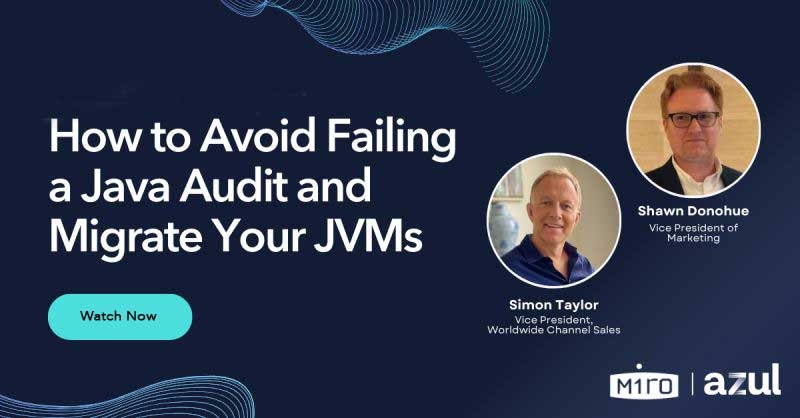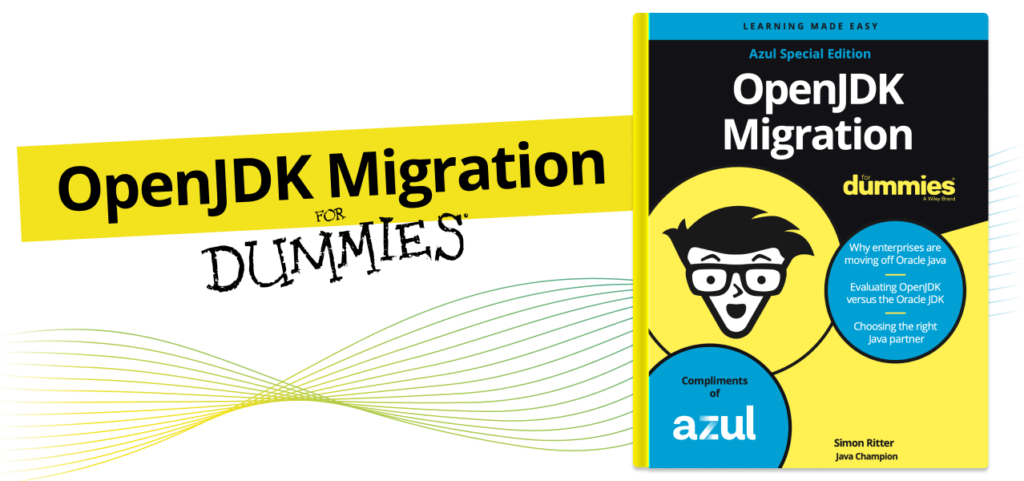
Oracle’s Java pricing and licensing change in January 2023 is old news now to many. To recap, Oracle has been incrementally moving subscribers to an employee-based pricing model. Rather than charging based on how many vCores are being used for Oracle Java or how many employees are using Oracle Java, Oracle is charging based on the number of employees. Regardless of whether they use Java. Regardless of whether the “employees” are full-time, part-time, or contractors.
This change has driven the cost of Oracle Java up significantly for most companies that have moved to employee-based pricing. If your company is on an employee-based pricing model or you are concerned that it soon will be, what will you do about it? Will you migrate off Oracle?

That’s the question Azul Vice President of Worldwide Channel Sales Simon Taylor and Miro Consulting Vice President of Marketing Shawn Donohue answered in their joint webinar, How to Migrate Off Oracle without Failing a Java Audit.
Together, Taylor and Donohue covered how to:
- Migrate off Oracle without failing a Java audit
- Navigate licensing complexities
- Benchmark performance, develop a migration plan, and train teams
Here are some highlights from the webinar. You can watch the webinar on-demand to get all the details, including the question-and-answer session at the end.
How to migrate off Oracle without failing a Java audit
First, Donohue wanted people to know to take Oracle’s aggressive stance on Java audits seriously. Oracle salespeople’s friendly calls to people in various departments will soon turn into audits to determine whether your company has Java instances it isn’t paying for and how many employees the company has. “If your dog could log in, your dog would probably need a license too,” Donohue joked.
Some companies request a one-year contract extension with Oracle, thinking they can use the year to prepare to migrate off Oracle Java to an OpenJDK distribution. Donohue warned that while the one-year contract carries one additional year of Java license, it comes with charges for the previous four years, so it’s essentially a five-year contract. “So if your plan is to sit and wait and do nothing, please do not do that,” Donohue advised, “because you will not be able to sign that one year contract. You will lock into five years’ worth, three years at minimum.”
Because of complexities like Oracle Java’s automatic security updates, which can trigger converting free Java into paid Java, Donohue recommended using a consultant (like Miro Consulting) and an OpenJDK distribution (like Azul).
How to navigate licensing complexities
Taylor explained there are four options once Oracle makes your organization aware of the audit process:
- Do nothing and hope it goes away – As noted above, this is a false choice, and the audit and price change will not go away. This is always a bad option.
- Try to negotiate with Oracle – Before you start trying to negotiate with Oracle, you must know what Oracle versions you have throughout your Java estate. As Azul Deputy CTO Simon Ritter explains in OpenJDK Migration for Dummies, you must make an inventory of all your Java instances. A software asset management tool might not catch everything, so using an consultant (like Miro) can be a critical step in a successful outcome.
- Strip out Java and convert to another development platform – Trying to remove Java rarely ends well, Taylor warned, because Java has many dependencies. People usually don’t know how many applications they have that use Java or are written in Java. When they start investigating, they realize that Java is prevalent throughout the organization. Removing it can have unintended consequences like breaking applications and services.
- Migrate to an OpenJDK distribution – If companies make an accurate inventory and have relatively simple architectures, most migrations can be straightforward, as Ritter explains in OpenJDK Migration for Dummies. Azul Platform Core license fees were 70% less than Oracle’s on average before oracle’s latest pricing change, and the difference is only greater now.

Benchmark performance, develop a migration plan, and train teams
Even if your only goal is to mitigate licensing costs today, you could gain significant additional benefits over time. Taylor said companies can enhance security and modernize applications for the cloud and improve application performance. Azul is the only Java provider besides Oracle that provides Security Patch Updates. Azul also has strict SLAs for making security patches available after Oracle has made them available.
Listen to the entire webinar
Information is critical for making the best decisions regarding your Java estate. Watch the entire webinar on demand, How to Migrate Off Oracle without Failing a Java Audit, and come away with more information and a better understanding of how Oracle manages Java. While you’re at it, read OpenJDK Migration for Dummies to learn how to conduct a successful migration from Oracle to an OpenJDK distribution.




